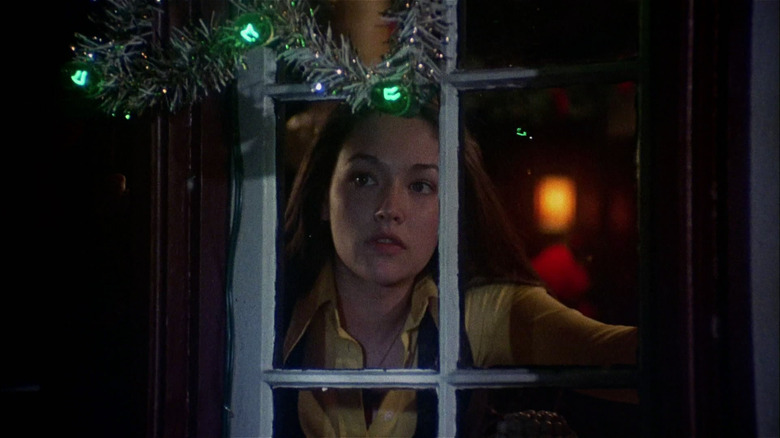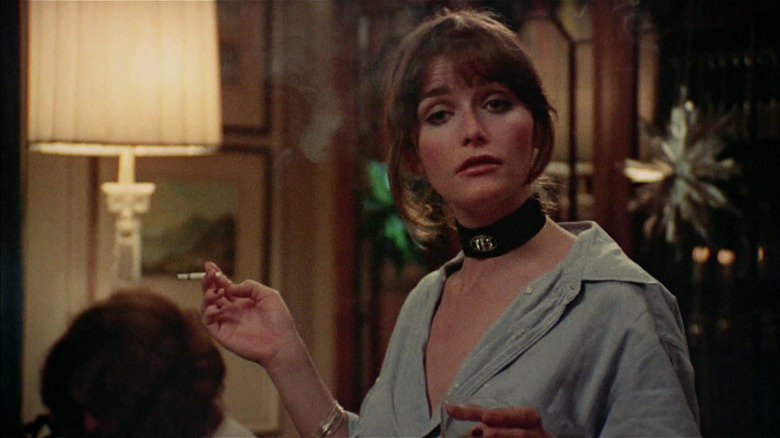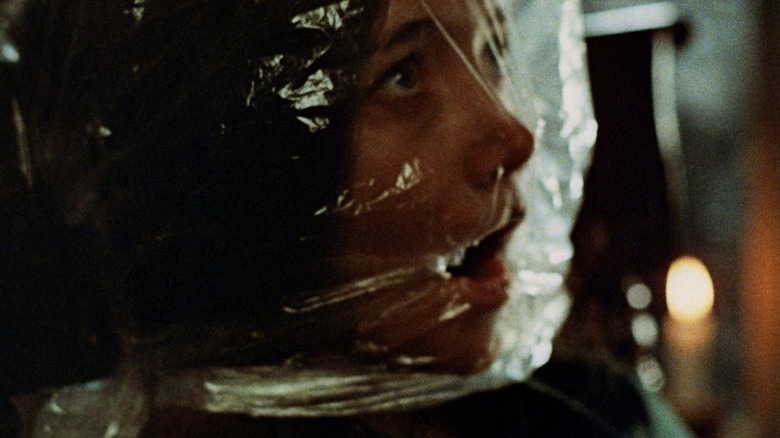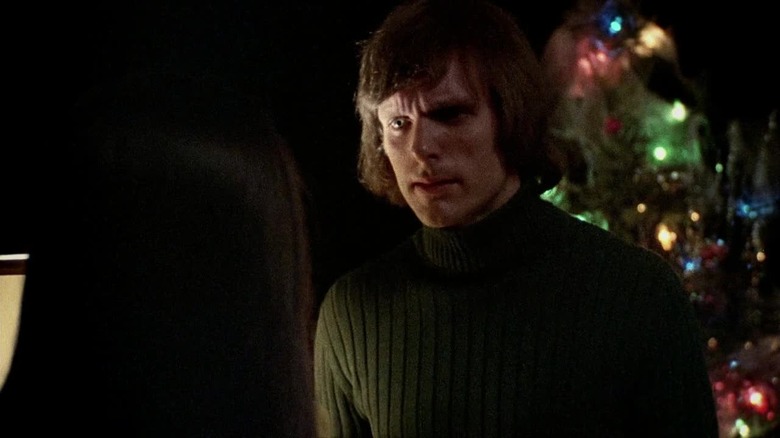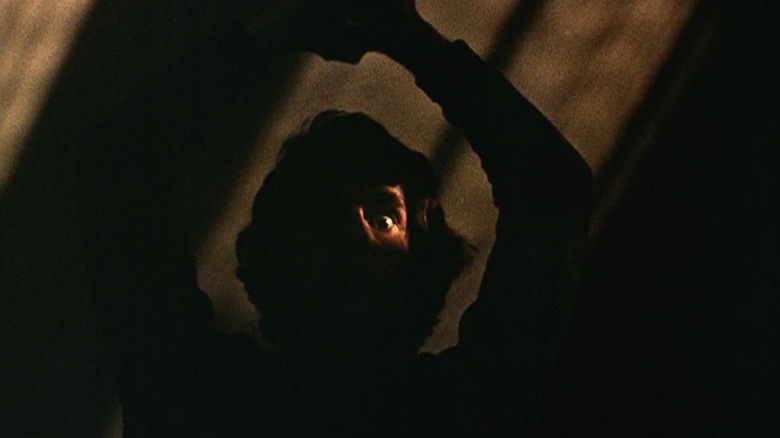The Daily Stream: Bob Clark's Black Christmas Is The Ultimate Seasonal Slasher
(Welcome to The Daily Stream, an ongoing series in which the /Film team shares what they've been watching, why it's worth checking out, and where you can stream it.)
The Movie: "Black Christmas"
Where You Can Stream It: Peacock, Pluto TV, and Tubi TV
The Pitch: A group of sorority sisters spending the winter holiday on campus begin receiving anonymous, lascivious phone calls that grow increasingly disturbing in nature. Thinking the phone calls are a harmless prank, the lush Barb (Margot Kidder) initially antagonizes the caller, but immediately has a change of heart when the caller responds with threats. Barb's friend Clare (Lynne Griffin) mysteriously disappears from the sorority house, and they soon discover a local girl has been found murdered in the nearby park. Convinced that there's a serial killer on the loose and that he's the one terrorizing their home, it's up to Barb, Jess (Olivia Hussey), and the rest of the sorority to save themselves, and each other.
Why It's Essential Viewing
Predating John Carpenter's "Halloween" and arriving the same year as Tobe Hooper's "The Texas Chain Saw Massacre," Bob Clark's "Black Christmas" never quite gained the mainstream traction of the former, but thanks to two remakes and a very vocal cult fanbase, has slowly gained traction in the public pop culture consciousness. "Black Christmas" is, and has always been, a radical examination of the way society devalues the safety of young women, and one of the most prominent examples of showcasing women who refuse to conform to the standards of polite, conservative society.
The film mostly follows Jess Bradford, a feminist heroine subverting the "damsel in distress" trope, and a groundbreaking icon pursuing an abortion against her boyfriend's wishes. (The film comes just one year after the landmark decision of Roe v. Wade). Not to be outdone, Jess' sorority sister Barb is a self-assured and loud-mouthed leader who refuses to let anyone push her around. She drops f-bombs with reckless abandon, usually because the person on the receiving end absolutely deserves it. The women of "Black Christmas" are fully realized human beings, repudiating the unfair, unrealistic, and downright insulting societal roles of what a woman is supposed to be in 1974. This subversion is what makes them all so fascinating to watch, but is also the possible motivating factor leading to their demise, through no fault of their own, but society's.
Nearly 50 Years Later, Black Christmas Still Rings True
As the harassing phone calls escalate, the sorority sisters notify the police who continually brush off their concerns as nothing more than a harmless prank. When Clare goes missing, it is assumed that she's left under her own free will and is out with frat boys, when the reality is that her dead body is covered in plastic wrap in the attic of the sorority house. After the disfigured remains of a townie are found in the park, the police finally take things seriously, but immediately blame Jess for the missing women after she kills her boyfriend Peter in self-defense. As we know, Peter is not the killer, and rather than the police doing their jobs, they pin the blame on him because it requires the least amount of effort.
The girls of Phi Kappa Sigma plead with the police to be taken seriously, but only John Saxon's Lieutenant Fuller is willing to hear them out. As we know to be all too true, one good cop is useless in a sea of a broken system. Something is wrong, very wrong, but until someone winds up dead, nothing happens. This shouldn't be something we're still dealing with nearly five decades later, but we are. In real life, women frequently report being harassed or stalked only to be told that the police can't actually do anything until there's been an attempt at violence. The horror is not just in Billy's obscene and murderous behavior, but also the reality that the people put in place to help us are mostly useless. There's a reason the film has been remade twice, because it's still relevant after all these years.
Peter is Trash and We Love To See Him Die
When Jess informs her pianist boyfriend Peter that she's going to have an abortion, he immediately becomes emotionally abusive. He tells her she will not be having an abortion, demands that the two become married, and tries to bully her into submission. Jess doesn't cower in fear of his presence, however, she stands her ground and calmly refuses to give in to his demands. She's made up her mind, and as the film carries on, it becomes painfully aware that Peter doesn't actually care about the clump of cells inside of her, he's a control freak with anger issues. The dude destroys a grand piano out of rage when Jess refuses to do as he's told her to do, and yet she persists on with a controlled stillness as he continues to act out. Yet again, the horror of this film is not rooted solely in the mysterious killer hiding out in the attic, but also in the dangers women face for simply standing up for themselves and telling a man, "No."
Clare's boyfriend Chris is one of the only male allies the women have, and it's his outburst at the police station paired with the discovery of Janice the townie's body that finally motivates them to do something. They bug the phone to try and discover the source of the calls, something that they definitely would not have done if it weren't for Chris calling them to the carpet. As disappointing as this realization is, it's an excellent look at why male allies are so vital to the progress of women's liberation. We can't do this on our own, because the reality is that plenty of men do not listen to anyone but other men.
The Horror is Still Legitimately Scary
Straight up, Billy is scary as hell. His phone calls are genuinely upsetting to hear and, juxtaposed against twinkling Christmas lights and snow-cloaked windows, it's even more unnerving. Clare struggling with plastic wrap around her face immediately instills a feeling of dyspnea, and watching Billy pull Mrs. Mac up the attic by hanging her with a crane hook through the face is still incredibly effective. Bob Clark would later direct the seminal classic, "A Christmas Story," and the holiday season is well captured amongst all of the horror, adding a level of discomfort that wouldn't feel as jarring had this film taken place on say, Arbor Day.
It's the calls, though, that really cement the horror. The manipulation of Billy's voice and the intensity of his screams are nightmare inducing. When Jess is told that the calls are coming from inside the house, a trope that would be repeated a few years later with "When A Stranger Calls," Jess chooses not to leave, instead arming herself to protect her sisters. The sisterhood of "Black Christmas" is genuine and sincere, because it comes from a place of knowing the only way they're going to survive is if they have each other's backs. No one else is going to protect them, so they can only protect each other. Is there anything scarier than that? I think not.
